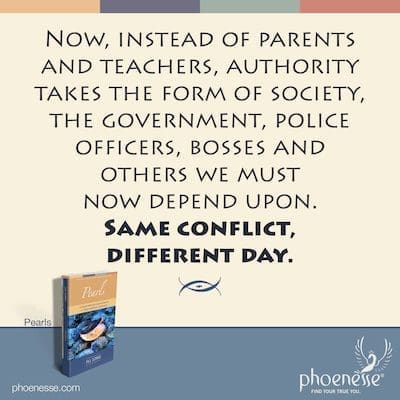We face our first conflict with authority at a very young age. Parents, siblings, relatives and later teachers all represent authority whose job is seemingly to say No…So there’s a barrier between the child and the adult in authority…On one hand, the child wants the parent’s love, and on the other, the child rebels against being restricted…Authority, then, is the hostile force of an enemy locking us behind prison bars and causing frustration…
The child then develops an impatient longing to grow up and become an adult so these restricting walls will go away. But then the child actually does grow up and the face of authority merely changes. Now, instead of parents and teachers, authority takes the form of society, the government, police officers, bosses and other people in positions of power we must now depend upon. Same conflict, different day…

Unfortunately, the ways we usually try to resolve this don’t work…First, let’s explore those who rebel and revolt. If this is our reaction, we see authority as our enemy…Authority is unjust and harmful, as well as narrow-minded and unhelpful…Our rebellion may be in the form of open fighting and resisting. For others, rebellion will be dimmed to a dull defiance…
The other category includes those who, at one time or another, turned around and thought, “If I join forces with the one in authority, much as I might hate them, I will be safe”. The extreme type in this category becomes the strict law-upholder, in both overt and subtle ways…In an effort to safeguard our chosen position as a law-upholder and keep our rebelliousness hidden—which deep down is no different from that of the law-breaker—we will stand in rigid opposition to the law-breaker…Fear of exposure motivates the law-upholder to be doubly “good”…
In both cases, there may be true goodness within, but both are reacting ignorantly and immaturely…So then what’s the remedy? If we’re the revolter type, we can meditate on the divine qualities of real authority. How does that differ from the imperfect human variety? Perhaps we can only see the distorted version; maybe we’ve never encountered a true authority. Just seeing this can lessen our resistance. Then we won’t mind half as much when the imperfect provider of true laws and authority appears, which is as much for our protection as for anyone else’s. It won’t feel like an enemy force…
We’ll see how currents in the “enemy” are also in us, just manifesting differently. This is the process for raising our level of consciousness—our maturity. Then we’ll be able to see the need for law and order. And we’ll appreciate the task of the authorities who are there to uphold it…
For people in the law-abider bucket, it may be helpful to search childhood memories to find the times when we revolted. This will help to uncover the memories of when we decided to turn around and jump ship…This will loosen the stranglehold on our self-righteous severity towards our brothers and sisters…
We can build common ground with others by seeing how their reaction lives in us, but not setting ourselves up as the judge. This balance is tricky to attain; we can only find it through solving our own inner struggle against authority…
Common criminals must be prevented from continuing their law-breaking ways, and this must be done by imperfect law-enforcing establishments…We can all contribute to building a world in which vicious circles get broken before they result in wrongdoing; the cornerstone for this work is to examine our own reactions to authority that, left unchecked, can set an avalanche rolling.
Return to Nutshells Contents
Return to Pearls Contents



